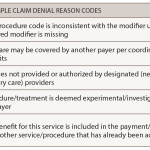
Ms. Manning
Laura Manning, RN, nurse coordinator for the Johns Hopkins Arthritis Center, relates a common patient scenario. “Let’s say the doctor orders the biologic monoclonal antibody Cosentyx [secukinumab] for psoriatic arthritis on day 1. On day 2, the pharmacy does a benefit scan and finds the prior authorization requirement. At Johns Hopkins we work with our internal pharmacy, which has helped streamline the authorization process. Still, it can take several days to find out the prescription has been denied and a letter from the clinician is required to overturn the denial.”
“When an insurer asks if the medication was ordered by a rheumatologist, it would be nice if that were deemed sufficient,” Ms. Ruffing says.
According to Ms. Manning, preparing each appeal letter can take 30 minutes, plus another 15 to 20 minutes negotiating the insurer’s website to file it.
QUICK TIP
Keep a spreadsheet for each payer your practice deals with. Include the payer’s:
- Website URL;
- Telephone/fax number for the prior authorization department;
- Telephone/fax number for the appeal department; and
- Any specific details, such as time limits for the authorization and appeals processes.
Appeals can take two weeks or more to adjudicate. In one case, a secukinumab denial was overturned after 32 days. “We had started the patient on a manufacturer-supplied free sample of the medication, but in the meantime, we found it really wasn’t working for this patient. So the doctor ordered a new medication, and that was denied. That appeal took another 28 days. And when the doctor ordered another new medication, the payer said they wanted us to try Cosentyx.”
Manufacturer samples or bridge programs aren’t always available, but if the patient is in bad shape and needs medication immediately, they can help. “But we shouldn’t have to rely on samples or bridge programs,” says Ms. Manning.
Unfortunately, bridge programs are prohibited by government insurance plans, including Medicare.
“The administrative burden, staff time commitments and response turnaround time required by prior authorization can be lessened by process improvements,” says Ms. Bonney. “So my first rule of prior authorization denial prevention is to have a reliable and thorough prior authorization process in place.” (See sidebar for tips and best practices.)
Reform Needed
The ACR has made reducing the burdens of prior authorization one of its top advocacy priorities. It issued a position statement on March 18, 2020, addressing prior authorization and the burdens it creates, and offering a number of recommendations for streamlining the process. Recommendations include reducing the number of rheumatology specialists who would be subject to prior authorization requirements, so long as they adhere to evidence-based practice and meet defined performance measures, and reducing through regular reviews the number of services or medications that require prior authorization.


